初中英语 7A Unit4 Food教案 牛津版
关注食品安全七年级英语牛津7A.unit4.Foodintegratedskills教案
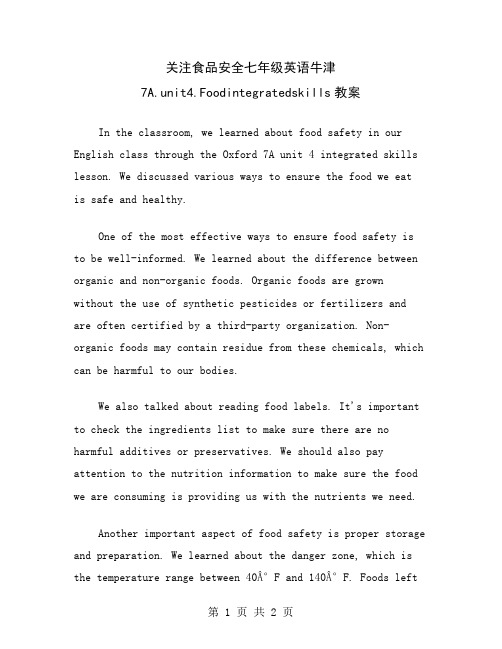
关注食品安全七年级英语牛津7A.unit4.Foodintegratedskills教案In the classroom, we learned about food safety in our English class through the Oxford 7A unit 4 integrated skills lesson. We discussed various ways to ensure the food we eatis safe and healthy.One of the most effective ways to ensure food safety is to be well-informed. We learned about the difference between organic and non-organic foods. Organic foods are grownwithout the use of synthetic pesticides or fertilizers and are often certified by a third-party organization. Non-organic foods may contain residue from these chemicals, which can be harmful to our bodies.We also talked about reading food labels. It's important to check the ingredients list to make sure there are no harmful additives or preservatives. We should also pay attention to the nutrition information to make sure the food we are consuming is providing us with the nutrients we need.Another important aspect of food safety is proper storage and preparation. We learned about the danger zone, which is the temperature range between 40°F and 140°F. Foods leftin this temperature range are at risk of bacterial growth, which can cause foodborne illnesses. It's important to store food in the refrigerator or freezer and cook it to the recommended temperature to ensure it is safe to eat.In addition to our classroom lessons, we also went on a field trip to a local farm. We learned about the different techniques farmers use to grow crops and raise livestock in a safe and sustainable way. We were also able to see the difference between organic and non-organic farming practices.Overall, our English class taught us the importance of food safety and how we can take steps to ensure the food we eat is healthy and safe. By being informed about the food we consume and taking proper precautions, we can protect our bodies and stay healthy.。
七年级英语Unit4 Food period Two教案 牛津版

Unit 4 Food period Nhomakorabeawo教学任务掌握下列单词diet ,important ,easy, tired , keep , fit , seldom , sweet , snack , Coke , between , meal ,sugar , fruit , milk , bread , meat , study , top ,lifestyle , fast , change , plan , juice .
T Look at them .Are they Strong ?
T Who is strong ?
T Why ?
T What do you eat for your breakfast /lunch / supper ?
(To thestrong one then to the weak one .
meat --- like fishpork,beef .
top --- the top of the tree
the best ,the highest
Step 3 Practice
Let the students read after the recorder for some times .
Let the students read freely ,try to read them correctly and recite them .
牛津英语7A初一英语公开课教案Unit4 Food
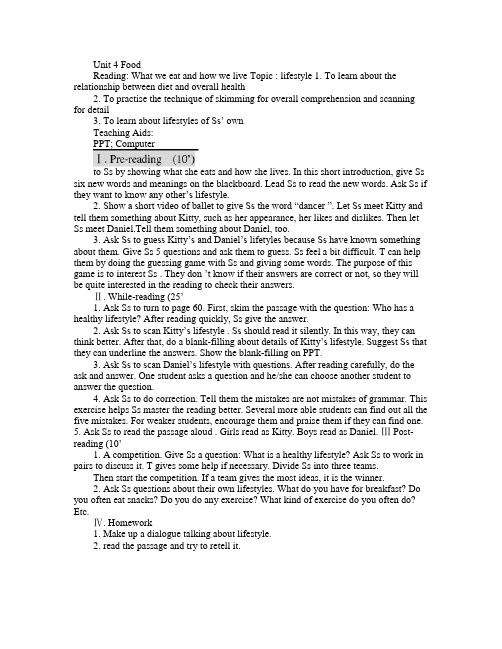
Unit 4 FoodReading: What we eat and how we live Topic : lifestyle 1. To learn about the relationship between diet and overall health2. To practise the technique of skimming for overall comprehension and scanning for detail3. To learn about lifestyles of Ss’ ownTeaching Aids:PPT; Computerto Ss by showing what she eats and how she lives. In this short introduction, give Ss six new words and meanings on the blackboard. Lead Ss to read the new words. Ask Ss if they want to know any other’s lifestyle.2. Show a short video of ballet to give Ss the word “dancer ”. Let Ss meet Kitty and tell them something about Kitty, such as her appearance, her likes and dislikes. Then let Ss meet Daniel.Tell them something about Daniel, too.3. Ask Ss to guess Kitty’s and Daniel’s lifetyles because Ss have known something about them. Give Ss 5 questions and ask them to guess. Ss feel a bit difficult. T can help them by doing the guessing game with Ss and giving some words. The purpose of this game is to interest Ss . The y don ’t know if their answers are correct or not, so they will be quite interested in the reading to check their answers.Ⅱ. While-reading (25’1. Ask Ss to turn to page 60. First, skim the passage with the question: Who has a healthy lifestyle? After reading quickly, Ss give the answer.2. Ask Ss to scan Kitty’s lifestyle . Ss should read it silently. In this way, they can think better. After that, do a blank-filling about details of Kitty’s lifestyle. Suggest Ss that they can underline the answers. Show the blank-filling on PPT.3. Ask Ss to scan Daniel’s lifestyle with questions. After reading carefully, do the ask and answer. One student asks a question and he/she can choose another student to answer the question.4. Ask Ss to do correction. Tell them the mistakes are not mistakes of grammar. This exercise helps Ss master the reading better. Several more able students can find out all the five mistakes. For weaker students, encourage them and praise them if they can find one.5. Ask Ss to read the passage aloud . Girls read as Kitty. Boys read as Daniel. Ⅲ Post-reading (10’1. A competition. Give Ss a question: What is a healthy lifestyle? Ask Ss to work in pairs to discuss it. T gives some help if necessary. Divide Ss into three teams.Then start the competition. If a team gives the most ideas, it is the winner.2. Ask Ss questions about their own lifestyles. What do you have for breakfast? Do you often eat snacks? Do you do any exercise? What kind of exercise do you often do? Etc.Ⅳ. Homework1. Make up a dialogue talking about lifestyle.2. read the passage and try to retell it.。
与家长一起分享食品信息七年级英语牛津7A.unit4.Foodintegratedskills教案

与家长一起分享食品信息七年级英语牛津7A.unit4.Foodintegratedskills教案During class, we discussed the importance of knowing where our food comes from, how it is processed, and its nutritional value. We also learned about food labels and how to read them to determine the calorie count, serving size, and ingredients in food. This knowledge can be shared with our parents, who play a significant role in the food choices we make at home.By sharing this information with our parents, we can work together to make informed choices regarding our food consumption. For example, we can take trips to the grocery store together and choose foods with less added sugar or saturated fat. We can also choose whole grains, lean protein, and nutrient-rich fruits and vegetables.We can also make an effort to cook meals at home rather than ordering takeout. This way, we can control the ingredients in our food, ensuring that we are eating meals that are both nutritious and delicious. We can also try new recipes together, incorporating more whole foods into our diets.In addition to discussing food choices, we can also talk about the importance of portion sizes. Often, we eat more than we need to, leading to weight gain and other health issues. By educating our parents on proper portion sizes, we can work together to ensure that we are consuming the appropriate amount of food.Furthermore, we can talk about the benefits of drinking water and limiting sugary drinks. Many of us consume too many sugary drinks, which can lead to weight gain and tooth decay. By choosing water instead, we can hydrate our bodies and avoid consuming unnecessary calories.In conclusion, sharing information about food with our parents can be a beneficial way to improve our diets and overall health. By working together, we can make informed choices about the foods we eat, the portions we consume, and the beverages we drink. So let's start the conversation and make strides towards a healthier lifestyle!。
Unit4《Food》学案1(牛津译林版七年级上)
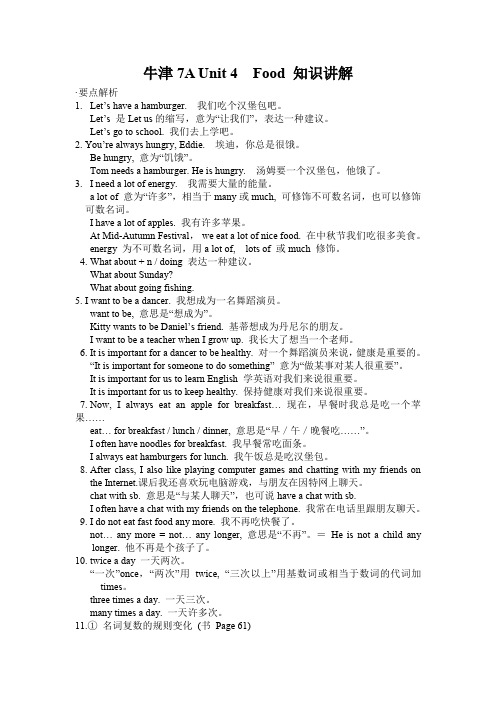
牛津7A Unit 4 Food 知识讲解·要点解析1. Let’s have a hamburger. 我们吃个汉堡包吧。
Let’s 是Let us的缩写,意为“让我们”,表达一种建议。
Let’s go to school. 我们去上学吧。
2. You’re always hungry, Eddie. 埃迪,你总是很饿。
Be hungry, 意为“饥饿”。
Tom needs a hamburger. He is hungry. 汤姆要一个汉堡包,他饿了。
3. I need a lot of energy. 我需要大量的能量。
a lot of 意为“许多”,相当于many或much, 可修饰不可数名词,也可以修饰可数名词。
I have a lot of apples. 我有许多苹果。
At Mid-Autumn Festival,we eat a lot of nice food. 在中秋节我们吃很多美食。
energy 为不可数名词,用a lot of, lots of 或much 修饰。
4. What about + n / doing 表达一种建议。
What about Sunday?What about going fishing.5. I want to be a dancer. 我想成为一名舞蹈演员。
want to be, 意思是“想成为”。
Kitty wants to be Daniel’s friend. 基蒂想成为丹尼尔的朋友。
I want to be a teacher when I grow up. 我长大了想当一个老师。
6. It is important for a dancer to be healthy. 对一个舞蹈演员来说,健康是重要的。
“It is important for someone to do something” 意为“做某事对某人很重要”。
It is important for us to learn English 学英语对我们来说很重要。
牛津版七年级英语上册 Unit4 Food--第5、6课时 教案

Unit 4 Food第五课时 (The fifth period)课前准备:1、复习本单元所学的语法项目。
2、复习上节课所学的词汇和句型。
教学目标:1、To revise the grammar items in this Unit.2、To revise the new words and drills.3、To do some exercises to consolidate the grammar items and language points.学习策略:Observation, discovery and induction of the grammar rules.(观察,发现,归纳语法规则。
)智能培养:The ability of synthetical use.(综合应用能力。
)教学设计:Grammar1、Three grammar rules.2、Some language points.3、Exercises for consolidation.教法步骤: TaskⅠ1、Ask Ss to tell adverbs of frequency and the differences among them.2、Ask Ss to tell the use of countable and uncountable nouns, give some examples.3、Ask Ss to tell the use of "a" and "an" and give some examples.4、To revise some language points in this part.Task ⅡDo exercises to consolidate the grammars and language points.教学反思:第六课时 (The sixth period)课前准备:1、复习学过的食物词汇和各种活动的词组。
探索食物来源七年级英语牛津7A.unit4.Foodintegratedskills教案
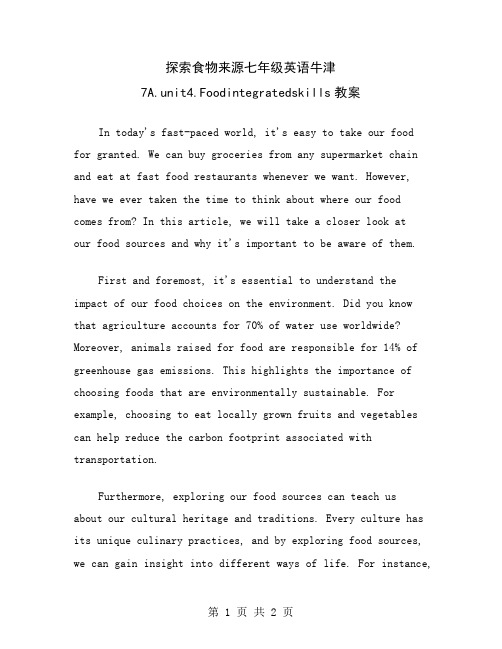
探索食物来源七年级英语牛津7A.unit4.Foodintegratedskills教案In today's fast-paced world, it's easy to take our foodfor granted. We can buy groceries from any supermarket chain and eat at fast food restaurants whenever we want. However, have we ever taken the time to think about where our food comes from? In this article, we will take a closer look atour food sources and why it's important to be aware of them.First and foremost, it's essential to understand the impact of our food choices on the environment. Did you know that agriculture accounts for 70% of water use worldwide? Moreover, animals raised for food are responsible for 14% of greenhouse gas emissions. This highlights the importance of choosing foods that are environmentally sustainable. For example, choosing to eat locally grown fruits and vegetables can help reduce the carbon footprint associated with transportation.Furthermore, exploring our food sources can teach usabout our cultural heritage and traditions. Every culture has its unique culinary practices, and by exploring food sources, we can gain insight into different ways of life. For instance,learning about the farming methods used to cultivate rice in Asia or coffee in South America can deepen our appreciationfor the cuisine of these regions.Additionally, exploring food sources can help us make healthier choices. When we know where our food is coming from, we can make informed decisions about what we put in our bodies. For example, we can opt for organically grown produce, which is free from harmful pesticides and chemicals.Finally, it's crucial to support local farmers, who are often integral to our communities. By purchasing theirproduce directly from them, we can help sustain their small businesses and ensure that fresh, nutritious food isavailable to everyone in the community.In conclusion, exploring our food sources can have a profound impact on our health, the environment, and our connection to our cultural heritage. By being mindful ofwhere our food comes from, we can make informed choices that benefit ourselves and the world around us. So, the next time you take a bite of your favorite dish, take a moment to think about the journey it took to reach your plate.。
七年级英语Unit4 Food period one教案 牛津版
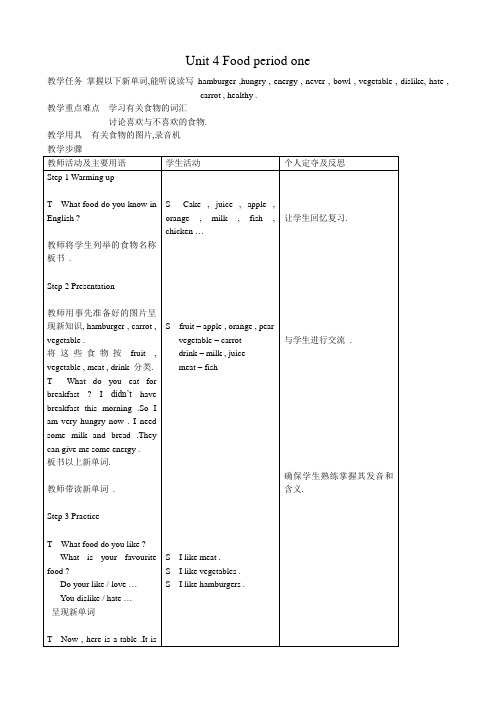
Recite the new words and dialogue .
教后感
S Cake , juice , apple , orange , milk , fish , chicken…
S fruit–apple , orange , pear
vegetable–carrot
drink–milk , juice
meat–fish
S I like meat .
S I like vegetables .
S I like hamburgers .
Finish the table .
S Millie likes bananas , carrots ,fish and eggs .
板书以上新单词.
教师带读新单词.
Step 3 Practice
T What food do you like ?
What is your favourite food ?
Do your like / love…
You dislike / hate…
呈现新单词
T Now , here is a table .It isa table from the Get Fit Club website .Write the food you like or dislike in the table .
4 Hobo is always hungry .
5 Eddie walks to his bowl many time a day .
教师让学生看58页的漫话,再次播发录音问
T Do you think walking to the bowl many times a day is a kind of exercise ?
- 1、下载文档前请自行甄别文档内容的完整性,平台不提供额外的编辑、内容补充、找答案等附加服务。
- 2、"仅部分预览"的文档,不可在线预览部分如存在完整性等问题,可反馈申请退款(可完整预览的文档不适用该条件!)。
- 3、如文档侵犯您的权益,请联系客服反馈,我们会尽快为您处理(人工客服工作时间:9:00-18:30)。
初中英语 7A Unit4 Food教案牛津版本单元要学习和复习各种各样的食物名称。
了解不同的饮食习惯以及它与健康之间的关系。
在学习本单元内容的同时,让同学们对照自己,谈论如何拥有一些平衡的饮食结构以保持身体匀称,健康。
通过语言技能的训练达到本单元的各学习目标:听:1、Guess the meaning of new words by looking at a questionnaire.(看调查问卷,猜测生词含义。
)2、Develop effective listening skills to extract specific information.(培养有效的听力技能,获取具体信息。
)说:1、Formulate questions about diets and respond appropriately.(练习说关于食物的问句并给以适当的回答。
)2、Ask“wh—”questions with the right intonation.(用恰当的语调练习wh—问句)3、Read one's own article to a classmate and check for mistakes.(读一篇文章给一位同班同学听,以检查错误。
)读:1、Guess general meanings of words from the context.(根据上下文猜词义。
)2、Identify specific meanings.(找出词的特定含义。
)3、Practise intensive reading.(练习精读。
)写:1、Express factual information about diets and lifestyles based on the model article.(以范文为例,表达有关食物和生活方式的实际信息。
)2、Select appropriate vocabulary and sentence constructions to write about personal details.(选择适当的词汇和句式,提供个人的具体信息。
)单元要点:1、Express likes and dislikes.(表达个人喜恶。
) e.g.I like rice. I dislike hamburgers.2、Use adverbs of frequency.(使用频率副词。
) e.g.I usually have fish and vegetables.3、Differentiate between countable and uncountable nouns.(区分可数名词与不可数名词。
) e.g.Some rice, two apples.4、Understand and use the indefinite articles,“a”and“an”.(理解并使用不定冠词a和an。
)I want to buy a book.I want to buy an e-dog.5、词组: a lot of be good/bad for Mid—Autumn Festival after class/school a top student play basketball play computer games a glass of milk chat with sb. walk to fast food try to do not…any more stay healthy twice a day get fat need to do not…at all want to do get tired more/less than go roller skating6、句型:Let's…I always eat/have an apple for breakfast.Once/twice a day.How often do you do exercise?Good luck with your new diet.It takes half an hour to cook.It's important for sb to do sth.第一课时 (The first period)课前准备:1、让同学们查询有关食物的词汇,越多越好。
2、让同学们带食物的图片或实物。
教学目标:1、To revise old vocabulary and learn new vocabulary about food.(复习旧单词并学习有关食物的新词汇。
)2、To talk about likes and dislikes with regard to food.(讨论喜欢的和不喜欢的食物。
)3、To use adjectives to describe different tastes.(用形容词描述不同的味道。
)教学要点:词汇 rice, hamburgers, chicken, fish, apples, oranges, vegetables, cakes, coke, chocolate, tea, mooncake, lemon, vinegar, hotpot, sugar, sandwich, sweet, sour, salty, spicy句型:1、What food do you like?What food does he/she likes?2、How does it taste?It tastes sweet/sour/salty/spicy.语言功能:Talk about different food.学习策略:1、To develop students to look at the same thing in many ways.(培养学生对同一事物要有不同看法。
)2、To develop students' ability to classify what they have learned.(培养学生对所学知识分类能力。
)智能培养:Make a chart and talk about it.教学设计:Food1、Talk about food for three meals and snacks.2、Talk about food for meals one likes and dislikes.3、Talk about food by the table.4、Describe different tastes about food.教学步骤:Task Ⅰ1、Talk about food for three meals and snacks. This is a fun activity to learn and revise vocabulary and spelling.2、Of all the food and snacks, get students to work in groups to make a table by asking:What do you like/dislike?Name Love Like DislikeS1:S2:S3:TaskⅡ1、Ask Ss to look at different kinds of food in Part A. Go through the words and make sure that they can pronounce them well and understand their meanings.2、Ask Ss to tick the boxes according to their own likes and dislikes.3、Ask some students to present their answers and say something about their likes and dislikes.4、Ask Ss to report their classmates' likes and dislikes according to the table in Part 1.5、If there is time, ask Ss to talk about their family as well.Task Ⅲ1、Try to bring some pictures of different kinds of food with strong tastes. Get Ss to know the meanings of "sweet, sour, spicy and salty".2、Ask Ss to think of other foods that are salty, sour, spicy or sweet.3、Look at P59 in the textbook and finish them.Task Ⅳ Exercises.教学反思:第二课时 (The second period)课前准备:1、预习阅读资料,查出生词或新语言点。
2、查阅相关资料,了解如何饮食和运动,保持身体匀称健康。
教学目标:1、To revise and expand vocabulary about food and lifestyles.(复习并扩展有关食物和生活方式的词汇。
)2、To learn about the relationship between diet and overall health.(学习饮食结构与身体健康之间的关系。
)3、To practise the technique of skimming for overall comprehension and scanning for detail. (练习快速阅读了解总体大意,快速浏览查找细节的阅读技巧。
)教学要点:词汇 before, diet, energy, exercise, fast food, healthy, important, lifestyle, seldom, tired, top, dancer, change, fruit, sweet, often, bread, meet, juice, person 句型1、Before, I seldom ate fruit and vegetables.Now I always eat an apple for breakfast and I often drink some milk.2、I swim twice a week.3、I do not eat fast food any more.学习策略:The technique of skimming.(快速阅读技巧。
